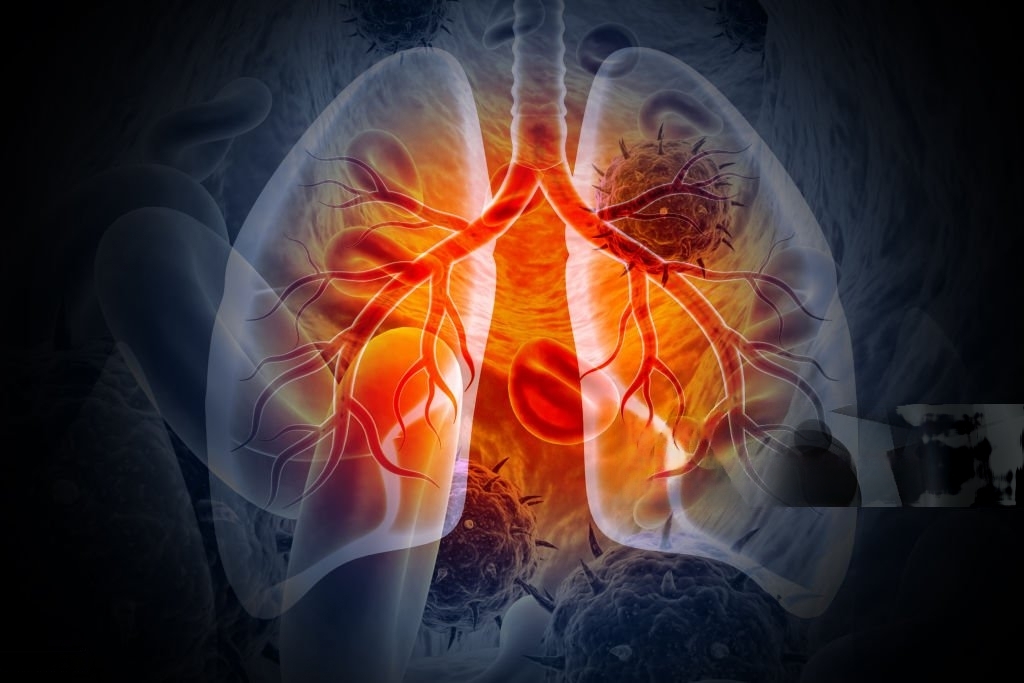
Medical illustration showing lung cancer medical background, 3D illustration. Image Credit : istok Photo
Lung cancer is widely acknowledged as one of the most prevalent and perilous cancers globally, with the American Lung Association noting its highest fatality rate. That’s the big reason, early detection is critical to improving lung cancer survival rates. Pulmonologists are experts in respiratory health and have a pivotal role in lung cancer treatment & diagnosis. This blog delves into the importance of early detection, the involvement of pulmonologists in diagnosis and treatment, and examines the array of options accessible to individuals struggling with this dangerous disease.
The Importance of Early Detection
Detecting lung cancer early greatly boosts treatment success and survival chances, because symptoms usually appear late, almost indicate at the time of the last stage of cancer. That’s why regular screenings, particularly for high-risk individuals like smokers or those with family history, are crucial. Pulmonologists lead in early detection efforts using methods like chest X-rays and CT scans, helping diagnose the disease before it progresses too far.
Risk Factors for Lung Cancer
Understanding these lung cancer risk factors is vital for early detection.
- Smoking: primary cause of lung cancer risk.
- Secondhand smoke: significant risk for lung cancer.
- Radon exposure: leading cause of lung cancer.
- Occupational hazards: increased risk of lung cancer.
- Air pollution: linked to higher lung cancer risk.
- Family history: genetic predisposition to lung cancer.
- Previous lung diseases: elevate lung cancer risk.
- Age: higher age associated with increased risk.
During patient consultations, pulmonologists assess risk factors and suggest screening measures tailored to individual profiles.
How Is Lung Cancer Diagnosed and Treated?
Early and precise diagnosis is key for crafting effective lung cancer treatments. Pulmonologists use various diagnostic methods to confirm the presence of cancer, assess its stage, and determine its extent. These methods may include:
1. Imaging Tests:
- CT Scans: High-resolution CT scans offer detailed lung images, aiding in the detection of abnormalities like tumors.
- PET Scans: Positron emission tomography scans show cancer cell activity, helping doctors determine the stage of the disease.
2. Biopsy:
- Bronchoscopy: This procedure is minimally invasive, using a thin, flexible tube with a camera to gather tissue samples from the airways for biopsy.
- Needle Biopsy: Using imaging guidance, a pulmonologist may perform a needle biopsy to obtain samples from lung nodules or masses.
3. Molecular Testing:
Analyzing tumor samples at a molecular level reveals specific genetic mutations or biomarkers. This information guides treatment choices, including targeted therapy or immunotherapy.
Lung Cancer Treatment Options Offered by Pulmonologists
After confirming a diagnosis, pulmonologists like Prof. Dr. Syed Arshad Husain, collaborate with multidisciplinary teams to create personalized lung cancer treatment plans, suiting each patient’s individual requirements. Treatment options may comprise:
1. Surgery:
In early-stage lung cancer, surgery to remove the tumor (lobectomy, wedge resection, or pneumonectomy) may be suggested to eliminate the cancerous tissue.
2. Radiation Therapy:
Radiation therapy utilizes high-energy beams to eliminate cancer cells or reduce tumor size. It can be used alone or alongside surgery or chemotherapy.
3. Chemotherapy:
Chemotherapy uses potent drugs to destroy or slow the growth of cancer cells. Typically given in cycles, it can be taken by mouth or through an IV.
4. Targeted Therapy:
Targeted therapy drugs pinpoint specific genetic mutations or proteins in cancer cells, sparing healthy tissue. They’ve shown promise in treatment for lung cancers like non-small cell lung cancer (NSCLC).
5. Immunotherapy:
Immunotherapy utilizes the body’s immune system to identify and combat cancer cells. It’s transformed advanced lung cancer treatment, providing lasting responses and better survival rates for some patients.
Conclusion: Empowering Patients through Early Detection and Comprehensive Care
During the battle against lung cancer, early detection and advanced treatment access are vital. Pulmonologists lead by conducting screenings, diagnostics, and tailored treatment for lung cancer. Through awareness, screenings, and timely care, they aim to enhance outcomes and life quality. With ongoing research and medical progress, lung cancer patient outlooks improve, offering hope.

